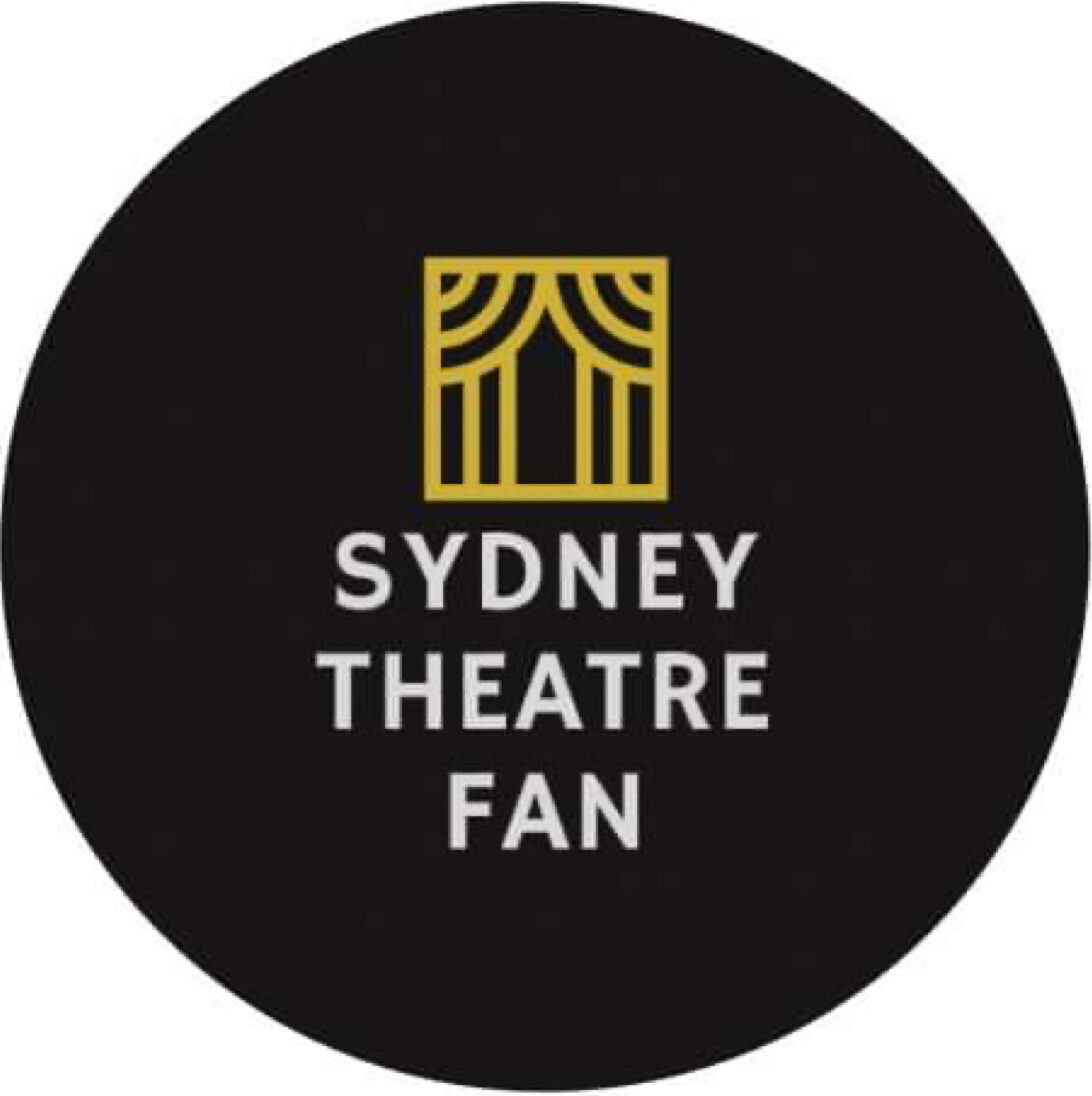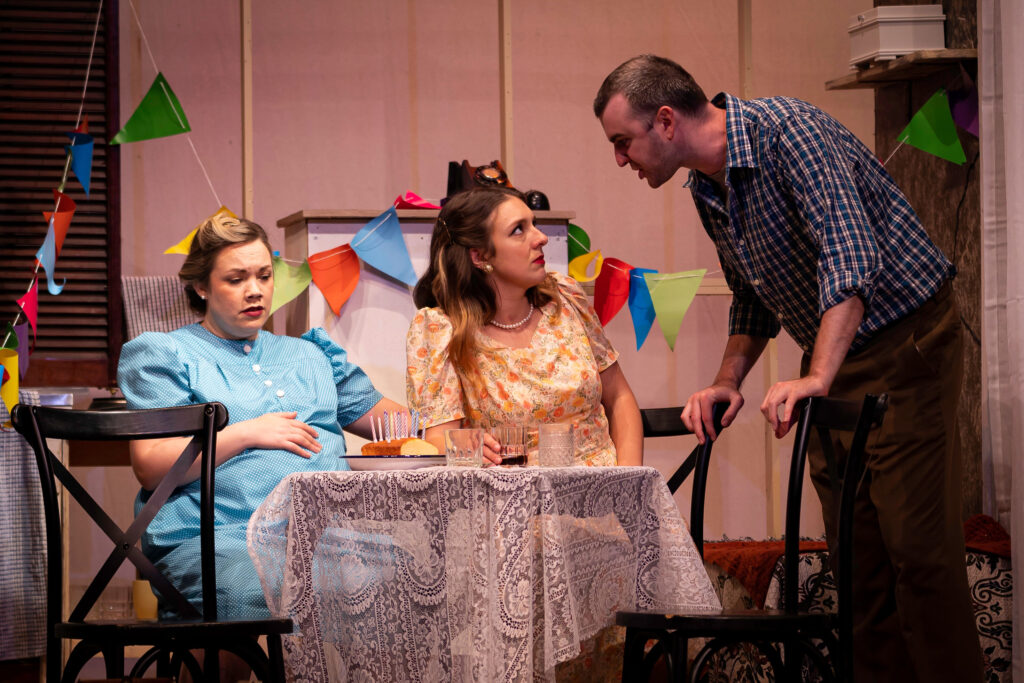Darlinghurst Theatre Company
11 July, 2023
Note: This has been edited to better reflect the pronouns of the cast. My intention is always to uplift and support others, particularly my extended family in the LGBTQIA & non-binary community. I am grateful to the cast member who provided feedback so I can continue to work at being a better ally 🙏🏼🏳️⚧️
It’s hard to know what it is that I just saw – NP&GC has so much going on – a giant disco ball suspended from the ceiling, musicians who are actors, audience participation, a rollicking score, unexpected/evocative lighting and copious amounts of vodka(?)
As usual, didn’t know anything before hand, easily charmed by social media snippets and the reviews of a friend. Really enjoyed this ‘opera’ style take on a snippet of War & Peace, with an updated score that I dare you not to sing for weeks to follow.
The cast each played one (or more instruments), which (per the director’s notes) were an extension of their character. The stage (which featured an immersive experience) also featured a walkway behind Row C. I purchased seats in Row C, suspecting this may be the case. While I had to turn around completely at times, this was made up for by both the proximity to the front stage, and the occasional brush of tulle over our heads as the cast twirled above us.
The cast was phenomenal – I could shout out each and every one, but really, I don’t want to spoil the show (that, and I promised I’d keep these brief from now on). *Edit*: I called out everyone in the cast. I couldn’t help myself, they were a phenomenal company. I’ll attempt brevity next time.
Grace Driscoll’s Natasha was an absolute dream – the young ingenue, who gave Victorian doll in an oversized babydoll dress, and peeled off layers as she was swept up and corrupted by the Moscow elite of the era.
Jules Pendrith’s Anatole, from their first appearance, was every bit the rockstar they were evoking (Bowie, mixed with Harry Styles, and maybe P!nk? But also very much none of those things). In the director’s notes, it is highlighted that the original music was modified and tailored to this specific cast – you won’t see this production ever again anywhere else – and Pendrith’s Anatole is one of the prime examples of this. Seductively singing in the lower part of their range, Pendrith will occasionally (and appropriately) belt notes several octaves up, and the theatre is immediately transformed into a glam rock concert. These moments were some of the most exciting in an already rich production.
Zoy Frangos’ Pierre evoked for me Pedro Pascal’s scruffy charm – he is “father”, as the kids say. Very much the grounding element of the piece. The show had mic issues our night, during Frangos’ opening performance. Unfortunately they had to pause the show to resolve, but before this Frangos’ pushed through completely unfazed, and doing his best to push vocally against the rest of the ensemble (he really held his own!).
I was obsessed with Jillian O’Dowd’s Marya–I think that was the point; her character exuded the camp, the drama, and the class young gay boys seek in their divas. She was in grande-dame drag, with the most ridiculous (& inspired) headpiece that shook as she commanded (both with her voice and physicality), in between sets of jamming out on the drums. Her interactions with the front row of the audience were particularly fun to watch. She also reminded me of the comedienne Rachel Dratch, which is a huge compliment as I’m a big fan of her versatility and big characters.
Kala Gare’s Sonja was a far cry from Six’s Anne Boleyn–we’ve already established this is a Six stan account, get over it–as she stepped into more of a supporting role (in that she was supporting her friend, Natasha; Gare pulls focus wherever she goes, and the piece was more ensemble anyway). Belting Sonja’s ballad in Act 2, providing narration for the Opera, and incredible feats during The Private and Intimate Life of the House (no spoilers) – Gare was so game for what this production threw at her (including an accordion, a keyboard, and a xylophone).
Lillian Hearne’s Princess Mary was bewitching – both physically and vocally. We are introduced to Mary in The Private and Intimate Life of the House, where she expresses the oppressive nature of their home life with rigid posture and stoic movement, while Hearne jumps up and down their impressive range for both comedic and dramatic effect). Followed by Natasha & Bolkonskys, Hearne’s Mary dripped with judgement, and delivered a delightful back and forth with Natasha. Hearne is another example where the Musical Direction team (Six’s Claire Healy, Hayes Theatre’s Victoria Falconer, and the prolific Benjamin Kiehne) adapted the piece to take full advantage of the voices of the cast. There were some issues in Act II, either with the mics or perhaps Hearne was fighting off a cold, so we didn’t get to hear some of the notes that I’m confident Hearne is capable of – this is disappointing only because Hearne was truly a standout in Act I. I’m envious of future audiences who get to enjoy the full breadth of the ‘Princess Mary’ experience!
The oft-absent Andrei was portrayed by the ever-present P. Tucker Worley. Worley traipsed through the theatre, acoustic guitar in hand, impressing us with his incredible dance moves, and commitment to character when acting as part of the ensemble). He immediately charms us from the opening number, both with voice and appearance– “Andrei isn’t here” is repeated a dozen or so times, so he is top of mind even when his character isn’t featured. The audience shares Natasha’s longing for Andrei, as we await Worley’s next appearance.
Calling Cameron Bajraktarevix-Hayward’s Dolokhov ‘sexy’ is redundant, because the entire cast exudes sensuality. However, their commitment to the dangerous and seductive Dolokhov is excellent. In John Doyle’s production of Sweeney Todd, much like in NP&GC, the small ensemble cast also plays instruments. Bajraktarevix-Hayward, when not featured, played (I believe) a cello, with the same malevolent strumming that Dolye’s Sweeney Todd used, to demarcate his killings. I presume this was intentional, as Dolokhov was known for committing a murder in the world of Great Comet, and is behind some of the more sinister plot developments. The actor visually relished their role in the debauchery, and was a delight to watch as he sneered from the sidelines.
Helené (Marissa Saroca) is established as…generous, shall we say. And Saroca is very much that, as she belts, entices and glides lithely through the space. Their powerful voices rounds out the ensemble, and provides a moral counterweight to the “good” Sonja, in the battle for Natasha’s soul.
Anton Berezin spends much of the performance as part of the ensemble–performing in the opera within the opera, as a servant in the Bolkonsky’s home, and other duties as required. Capable and certainly on par with the rest of the outstanding cast. But in Act II, he is showcased as the namesake in Balaga, an upbeat whirlwind of a number that may have you out of your seat dancing (literally). Chanting to “hey Balaga, Ho Balaga”, the ensemble supports Berezin’s growls as the song builds to an exciting crescendo.
There’s so much to love about this production, though it may not be for everyone. There’s a particularly meta moment in Act I, where Natasha, watching The Opera, sings “I cannot follow the opera, or even listen to the music…queerly dressed actors, moving and singing so strangely.” NP&GC IS an opera–it even says it in the Prologue–and that may not be for everyone, who needs a bit of a break between musical numbers.
The production deliberately creates a foreign space: “We have made the world so heightened and so non-naturalistic that their stories, their movements, their expressions and their use of a musical instrument becomes a new norm for the world we have created (Director’s Notes)”. While the immersion and other-worldliness is one of the things that makes this production so special, there will be some who might not be game (particularly in the case of a spouse who prefers more traditional musicals – sorry babe!).
In a production that defied, subverted, and dragged up the concept of gender, the costuming by Nicol & Ford elevated this world into the stratosphere. I’ve never coveted a pair of trousers so much than the extreme-wide-leg pants worn by Pierre and others. Some of the male-presenting roles were in heeled boots; the female-presenting roles in combat boots; the costumes played with fabrics, sheen, shape, colours to reinforce that you weren’t in any world that you’ve visited before, but one that you’d want to stay in for a sinfully good time. The costumes enhanced the sensuality, the danger, the naïveté, and the campness of the characters.
The lighting and set were equally stunning. There were at times moments where the actors weren’t quite in the light (in part perhaps due to the way they’d move around the entire space, or how they’d be in character even when interacting off to the side). I suspect this is more blocking – despite this minor observation, the lights were ethereal, and the use of warm and blue lights on the faces of the characters highlighted the duality, the good-vs-bad, the moral conflict in each.
The set was very cool, it reminded me of a gyrosphere, or an orbitall diagram. There were certainly some surprises which I won’t spoil, and the way in which the cast moved around and onto it. The loft areas were challenging, as the safety rails sometimes came into conflict with sightlines, and the blocking (particularly Anatole and Pierre in Act II) favoured each other rather than the audience, so we could quite see. Still, the levels made the set more interesting and exciting.
I also make a note that I’d love to look into the other musicals by creator Dave Malloy. He has 14 original pieces, which include Beowulf -1000 years of baggage, Black Wizard/Blue Wizard (based on role playing games), and Little Bunny Foo Foo, which was a nursery rhyme my nana always used to sing to me.
There were a few slower paced moments, which felt particularly slow, given the frenetic pace of the rest of the piece. Particularly because it is on the long side. In saying that, these slower moments let the cast shine, and its only to be expected to have some still moments amongst the frenzy.
You really have to see Natasha & Pierre – like many fleeting productions of this calibre that pass through Sydney (Belvoir’s Into the Woods, Hayes’ Metropolis, Sydney Opera House’s Amadeus), you’ll only regret not getting your tickets now, before they almost certainly are exhausted. Maybe even twice, if you have the opportunity to try the immersive experience (it’s nothing scary, and both cast and audience are very supportive). Perhaps try sitting behind Row D or E, so you can see the full spectacle unfolding. The closer rows make it a bit hard to see the action behind (though there’s so much going on at any one time, it’s hardly a big loss).
I’ll leave you with another quote from the production team, which suimmarises their intent:
The experience of Great Comet can provide escapism, but also an encouragement to see others beyond the basic labels thrust upon them.

